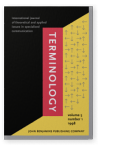Vol. 5:1 (1998) ► pp.21–40
Theories 'of' terminology
A quest for a framework for the study of term formation
Traditional "theory " of terminology, as far as I understand it, has two shortcomings. The first, which is now pointed out by many researchers, is that the way in which the study of terms is viewed is too restricted, and the descriptive means such as "concepts" are not rich enough. This becomes clear if one faces actual terms as empirical objects. The second shortcoming is that there is no guarantee in the "theoretical" framework itself that the resultant description can logically be claimed to be about terms and/or terminology. This shortcoming seems to have been overlooked by most researchers. This paper is devoted to an examination of this second problem, with special reference to the study of term formation.
Cited by (3)
Cited by 3 other publications
This list is based on CrossRef data as of 10 july 2024. Please note that it may not be complete. Sources presented here have been supplied by the respective publishers. Any errors therein should be reported to them.
